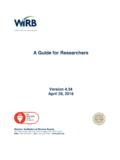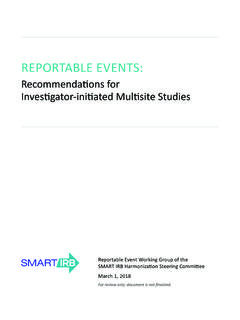Transcription of The Spaced-Retrieval Technique - Myers Research Institute ...
1 The Spaced-Retrieval Technique ABOUT THE Myers Research Institute . One of 15 Research institutes in the United States connected to a long term care facility, Myers Research Institute (MRI) is a leader in the field of applied gerontological Research . MRI is dedicated to a multidisciplinary program that will help frail, elderly, and disabled individuals realize their highest level of fulfillment in an atmosphere of respect, dignity and caring. Cameron J. Camp, , Director and Senior Research Scientist at Myers Research Institute , Menorah Park Center for Senior Living in Beachwood, Ohio, is a noted psychologist specializing in applied Research in gerontology and applied cognitive aging. He received his doctorate in experimental psychology from the University of Houston in 1979. For 16 years he served in academic settings, teaching coursework in adult development and aging while rising to the rank of Professor of Psychology at the University of New Orleans.
2 His current Research involves the design of interventions to alleviate problem behaviors and increase the level of functioning for persons with brain injury. He has co-authored three college textbooks and published over 80. articles in journals such as the Journal of Gerontology, The Gerontologist, Experimental Aging Research , Alzheimer Disease and Related Disorders, Clinical Gerontologist, Psychology and Aging, The Journal of Clinical and Experimental Neuropsychology, and the Journal of the International Neuropsychological Society. Dr. Camp lectures nationally on the topic for this program including the latest clinical Research and related application of Montessori-Based Dementia Programming and the techniques of Spaced-Retrieval with cognitively impaired individuals. Megan Malone, CCC-SLP, is a speech-language pathologist and Research associate with Myers Research Institute . In this capacity, Megan oversees both federally and privately funded Research grants focused on implementing interventions with older adults with dementia.
3 She is the lead trainer at the Institute , teaching training seminars to professionals working with older adults on a variety of interventions, including the Spaced-Retrieval Technique and Montessori- based programming. Megan attended Miami University in Oxford, Ohio, for her undergraduate studies in speech pathology and received her master's degree from Case Western Reserve University in Cleveland, Ohio. She has been part of the staff of Myers Research Institute for seven years. WHAT IS THE Spaced-Retrieval Technique ? Spaced-Retrieval (SR) is a memory intervention that gives individuals practice at successfully recalling information over progressively longer intervals of time. The goal of SR is to enable individuals to remember important information for clinically meaningful periods of time. SR has been used successfully as a rehabilitation Technique by speech-language pathologists, occupational therapists, and physical therapists to enable clients with cognitive impairment to recall important information such as safety techniques, orientation information, schedules, etc.
4 SR is an approach that can be used during rehabilitative treatment to enable clients to reach therapy goals and its use is reimbursable skilled service. Participants in this course will learn the principles of the Spaced-Retrieval Technique , types of clients who are likely to benefit from SR treatment, goal writing strategies, billing procedures, and strategies for successful transitioning SR goals to the clients' living environments. Participants may choose to attend Day One only of the program for an overview of SR or both 1. Days One and Two for a hands-on experience in using SR with specific clients, goals, and environments. INTENDED AUDIENCE. Speech-Language Pathologists, Occupational Therapists, Physical Therapists, Nurses, Social Workers, Activities Professionals, and Administrators. We recommend professionals who work in direct care with clients to attend both Day One and Day Two of the course.
5 The Day One Only option is recommended for administrators, supervisors, etc., who would benefit from an overview of SR but will not be directly implementing it with clients. CERTIFICATION AND CREDENTIALING. Upon completion of the one-day Seminar, participants are qualified to complete an examination for a User's Certificate from Myers Research Institute . A minimum score of 80% correct is required to earn a User's Certificate in SR. The certification exam may be attempted a total of three times. Persons attending both Days One and Two of the course will be eligible to become credentialed in SR. The credentialing process involves successful completion of the certificate exam plus a hand-scored case study exam after a one-month period following the Workshop. Credentialed individuals meet requirements which enable them to provide in-service training for other persons within their organization on the use of SR.
6 COURSE OUTLINE. Day 1: Certification Seminar Day 2: Credentialing Workshop 8:00 AM-8:30 AM 8:00 AM 8:30 AM. Registration/Continental Breakfast Registration/Continental Breakfast 8:30 AM-10:00 AM. 8:30 AM 9:00 AM. Introduction/Brief Overview of Memory Review of Day One 10:00 AM-10:15 AM. BREAK 9:00 AM 10:00 AM. 10:15 AM-11:00 AM SR Screen Tutorial & Role Play SR Overview 10:00 AM 10:15 AM. 11:00 AM-12:00 PM BREAK. Case Studies of SR Sessions 10:15 AM 12:00 PM. 12:00 PM 1:00 PM SR Therapy Simulation LUNCH ON OWN 12:00 PM 1:00 PM. 1:00 PM -1:30 PM LUNCH ON OWN. Building a Caseload Using SR. 1:30 PM-2:15 PM 1:00 PM -2:00 PM. Functional Goal Writing Using SR Action Planning for Transitioning SR. 2:15 PM -2:30 PM 2:00 PM 2:30 PM. BREAK Training/In-Servicing Tips 2:30 PM-3:00 PM 2:30 PM 3:00 PM. Documentation/Reimbursement Q & A Course Evaluations 3:00 PM-4:00 PM Certification Test Conclusion Overview of Transitioning SR to Client's Environment 4:00 PM-4:30 PM.
7 Questions/Comments/Adjournment 2. LEARNING OBJECTIVES. By the end of Day 1, the learner will be able to: 1. Identify interventions for dementia 2. Identify ways current dementia programming may be improved upon 3. Identify cognitive skill levels needed to implement SR. 4. Devise measurable goals to increase functionality in persons with dementia By the end of Day 2, the learner will be able to: 1. Identify applications of SR to different disciplines 2. Learn how to correctly execute the SR Screening Measure 3. Learn a model to transition SR to the client's environment ACCREDITATION. MRI will provide program information for organizations interested in applying for CEU. approval from professional associations. 3.


